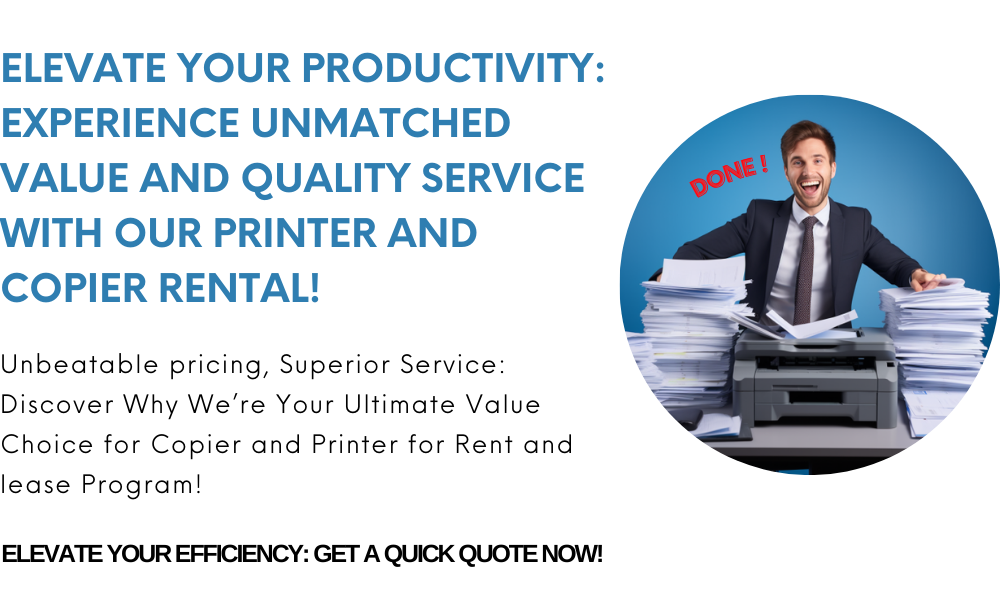
Empowering Your Business Through Copier Leasing

Empowering Your Business Through Copier Leasing
Part 1: Understanding the Benefits of Copier Leasing for Business Growth
Introduction
In today’s competitive business landscape, operational efficiency and cost management are critical to success. One area that often incurs hidden expenses is document management. For businesses that rely on high-quality printing and copying, owning a copier may seem like a logical investment. However, copier leasing offers a more flexible, cost-effective solution.
This blog explores how copier leasing empowers businesses, providing a detailed look at its advantages, the leasing process, policies tied to it, and practical advice for entrepreneurs. Whether you’re a startup or an established company, copier leasing can revolutionize how you manage your office equipment and resources.
Why Choose Copier Leasing Over Buying?
Leasing a copier presents several key benefits compared to outright purchase, making it an attractive option for businesses of all sizes.
1. Lower Upfront Costs
Purchasing a copier involves significant initial investment, which can be a financial strain, especially for startups. Leasing eliminates the need for large upfront payments, allowing businesses to allocate funds to other critical areas like marketing or staff development.
Example: A new logistics company in Cebu opted to lease a multifunction copier, redirecting saved capital toward hiring additional personnel.
2. Predictable Monthly Expenses
Leasing agreements typically involve fixed monthly payments, making budgeting simpler. Businesses can enjoy the peace of mind that comes with predictable operational costs, free from unexpected repair or maintenance expenses.
3. Access to Advanced Technology
Technology evolves quickly, and outdated equipment can hinder productivity. Leasing allows businesses to upgrade to the latest copier models without purchasing new equipment, ensuring they always have access to cutting-edge features like wireless printing, cloud integration, and energy efficiency.
4. No Depreciation Concerns
Copiers, like other office equipment, depreciate over time. Leasing shifts the burden of depreciation to the provider, freeing businesses from concerns about resale value or obsolete equipment.
5. Inclusive Maintenance and Support
Most leasing agreements include maintenance, repairs, and consumables, ensuring that businesses don’t have to worry about the costs and logistics of equipment upkeep.
The Copier Leasing Process: A Step-by-Step Guide
Leasing a copier may seem complex, but understanding the process makes it straightforward.
1. Assess Your Business Needs
Start by evaluating your document management requirements. Ask yourself:
- What is your average monthly print volume?
- Do you require color printing, or will black-and-white suffice?
- Are advanced features like scanning, faxing, or cloud integration necessary?
Tip: Consider your business’s growth trajectory and choose a copier that can accommodate increased demand.
2. Research Providers
Look for reputable leasing companies with positive reviews and a strong track record in the Philippines. Key factors to consider include:
- Range of available copier models.
- Flexibility in leasing terms.
- Responsiveness of customer support.
3. Request Quotes and Compare Plans
Reach out to multiple providers to obtain quotes. Compare their offerings, focusing on factors like pricing, included services (e.g., maintenance), and upgrade options.
4. Review the Leasing Agreement
Carefully read the contract, paying attention to:
- Monthly payments.
- Duration of the lease.
- Included services and consumables.
- Policies for upgrades, repairs, and early termination.
Pro Tip: Negotiate terms to align the agreement with your business’s specific needs.
5. Delivery and Installation
Once you’ve signed the agreement, the provider will deliver and install the copier at your office. Many providers also offer initial training for staff to ensure proper usage.
Policies Tied to Copier Leasing
Understanding the policies associated with copier leasing helps businesses avoid potential pitfalls and maximize benefits:
1. Maintenance and Repairs
Most leases include regular maintenance and repairs. The contract should specify the provider’s response times and coverage for replacement parts.
2. Consumable Management
Some agreements include consumables like toner and paper, while others require businesses to procure these separately. Clarify what’s included to avoid unexpected costs.
3. Fair Usage Policies
Leases often come with usage limits to prevent overuse or excessive wear. Exceeding these limits may incur additional charges, so it’s important to monitor your usage.
4. Upgrade Options
Many providers allow businesses to upgrade to newer models during the lease term. This ensures access to the latest technology without waiting for the contract to end.
5. End-of-Lease Terms
Understand the procedures for returning or renewing the lease at the end of the term. Some providers offer buyout options if you wish to keep the equipment.
Practical Advice for Entrepreneurs
For entrepreneurs in the Philippines, copier leasing offers a practical solution for managing office equipment without overextending budgets. Here’s how to make the most of it:
1. Prioritize Flexibility
Choose a provider that offers customizable leasing terms, allowing you to scale services up or down as your business grows.
2. Leverage Training Opportunities
Many leasing agreements include training sessions for staff. Take advantage of these to ensure your team knows how to use the copier effectively and avoid costly mistakes.
3. Monitor Usage Regularly
Use built-in tracking features to monitor print volumes and identify inefficiencies. Adjust policies, such as limiting color printing, to optimize usage and reduce costs.
4. Align with Sustainability Goals
Opt for energy-efficient copiers and recycling programs to minimize your business’s environmental impact while saving on operational costs.
5. Stay Informed About Market Trends
Keep an eye on emerging copier technologies and leasing models. Staying informed helps you negotiate better terms and maintain a competitive edge.
Real-World Impact of Copier Leasing
Consider the case of a mid-sized retail chain in Metro Manila:
The Challenge:
The company relied on outdated printers that frequently broke down, causing delays and increasing repair costs.
The Solution:
By leasing a high-speed multifunction copier, the business gained access to reliable technology and included maintenance services.
The Results:
- Improved Productivity: Document handling time reduced by 25%.
- Cost Savings: Monthly expenses decreased by 15% due to predictable leasing fees and reduced downtime.
- Employee Satisfaction: Staff appreciated the streamlined workflows and user-friendly equipment.
This example highlights how copier leasing empowers businesses to focus on growth rather than equipment management.
FAQs
Q1: How is leasing different from renting?
Leasing typically involves longer-term agreements (1-5 years) with options for upgrades and included services, while renting is often short-term and more flexible but may lack additional benefits.
Q2: Can I lease multiple copiers at once?
Yes, many providers offer packages for leasing multiple machines, ideal for businesses with high document management demands.
Q3: Are there penalties for terminating a lease early?
Early termination policies vary. Some providers charge a fee, while others offer flexible terms. Always review the contract before signing.
Q4: How do I ensure I’m not overpaying for a lease?
Regularly assess your usage and compare it to your lease terms. Use analytics tools to identify inefficiencies and negotiate adjustments with your provider.
Q5: Are upgrades included in leasing agreements?
Many providers offer upgrade options, either as part of the lease or for an additional fee. Clarify this during negotiations to ensure flexibility.

Empowering Your Business Through Copier Leasing
Part 2: Advanced Strategies and Future Opportunities in Copier Leasing for Philippine Businesses
Introduction
In Part 1, we discussed the foundational benefits of copier leasing, from cost savings to flexibility. This second part delves into advanced strategies that businesses can use to optimize their leasing agreements. It also explores future opportunities and trends in copier leasing for Philippine businesses, offering a roadmap for staying competitive in an evolving market.
Advanced Strategies for Optimizing Copier Leasing
To maximize the benefits of copier leasing, businesses need to go beyond the basics and adopt more strategic approaches:
1. Leverage Data Analytics for Better Decision-Making
Many modern copiers come equipped with analytics tools that provide detailed reports on usage patterns. Businesses can use this data to:
- Identify cost-saving opportunities (e.g., switching from color to black-and-white printing for specific tasks).
- Forecast consumable needs, ensuring uninterrupted operations.
- Evaluate whether the current copier meets growing demands.
Example: A marketing firm in Manila reduced toner costs by 15% after analyzing usage reports and implementing policies to restrict color printing.
2. Adopt Eco-Friendly Practices
Leasing provides access to energy-efficient copiers that align with sustainability goals. Businesses can further reduce their environmental impact by:
- Printing double-sided by default.
- Using recycled paper.
- Participating in provider-led recycling programs for toner cartridges.
Tip: Highlight these practices in your company’s CSR (Corporate Social Responsibility) initiatives to enhance your brand reputation.
3. Negotiate for Customizable Agreements
One-size-fits-all agreements rarely suit every business. When negotiating with a leasing provider, consider:
- Flexible usage terms that align with your operational cycles.
- The inclusion of consumables and training sessions.
- Options for scaling up or down mid-contract.
Pro Tip: Start with a shorter lease term to test the provider’s services before committing to a long-term agreement.
4. Train Staff to Maximize Copier Features
Advanced copiers come with numerous features that can boost productivity, such as:
- Cloud integration for easy document storage and sharing.
- Automated workflows for repetitive tasks like scanning and organizing files.
Training employees to utilize these features ensures your business fully benefits from the leased equipment.
Opportunities in Copier Leasing for Philippine Businesses
As the copier leasing industry evolves, businesses in the Philippines have unique opportunities to capitalize on its growth:
1. Supporting Hybrid Work Models
The rise of hybrid work environments has increased demand for copiers that support remote operations. Features like mobile printing and cloud storage enable seamless collaboration between in-office and remote employees.
Example: A tech startup in Cebu uses a leased cloud-enabled copier to digitize and share documents with remote team members, reducing reliance on physical files.
2. Enhancing Document Security
With increasing cyber threats, data security is a priority for businesses. Leasing agreements now include devices with:
- Encrypted printing to protect sensitive information.
- Secure access controls, ensuring only authorized personnel can use the copier.
- Automatic data wiping to prevent information leaks.
Relevance: Industries like healthcare, finance, and legal services in the Philippines can benefit significantly from these enhanced security features.
3. Accessing Advanced Technology Without Large Investments
Businesses often hesitate to invest in cutting-edge technology due to high costs. Leasing eliminates this barrier, allowing companies to access the latest copiers with features like:
- AI-powered maintenance for minimal downtime.
- Multifunction capabilities that consolidate multiple devices into one.
- Sustainable designs that align with eco-conscious values.
4. Leveraging Subscription-Based Models
Subscription-based leasing plans are becoming more popular, offering flexible payment options based on usage. These plans allow businesses to scale services up or down, making them ideal for startups and seasonal operations.
Example: A boutique in Davao subscribes to a pay-per-page leasing plan, ensuring they only pay for what they use during peak shopping seasons.
Future Trends in Copier Leasing
The future of copier leasing in the Philippines is being shaped by technological advancements and changing business needs. Here’s what to expect:
1. AI-Driven Solutions
Artificial intelligence is revolutionizing copier functionality. Future devices will:
- Predict maintenance needs, scheduling repairs before problems occur.
- Optimize print settings based on document type, reducing waste.
- Provide actionable insights to help businesses improve efficiency.
2. Greater Focus on Sustainability
Sustainability is becoming a non-negotiable priority. Leasing providers are introducing eco-friendly copiers with:
- Lower energy consumption.
- Biodegradable or recyclable toner cartridges.
- Modular designs for easy upgrades and repairs.
Impact: Businesses aligning with these practices will not only reduce operational costs but also meet global sustainability standards.
3. Integration with Smart Offices
As smart office technologies grow, copiers are integrating with IoT (Internet of Things) devices. For instance:
- Sensors can monitor copier performance and alert users about issues.
- Connected systems can automate document handling workflows.
Result: Businesses save time and improve productivity through automation.
4. Expansion of Short-Term Leasing Options
The demand for flexible, short-term leases is rising. These options cater to businesses with temporary needs, such as events, seasonal campaigns, or project-based work.
5. Emphasis on Customization
Leasing providers are moving toward highly customizable agreements, allowing businesses to tailor their plans based on specific requirements, such as usage levels, included services, and contract duration.
How to Stay Ahead in the Copier Leasing Market
To make the most of these trends, businesses should:
1. Partner with Innovative Providers
Choose leasing companies that prioritize sustainability, technology integration, and customer support. Providers offering AI-powered solutions and eco-friendly options are better suited to meet future demands.
2. Regularly Reevaluate Leasing Agreements
Periodically assess whether your current leasing terms align with your business’s evolving needs. Adjust contracts or switch providers if necessary.
3. Invest in Employee Training
As copiers become more advanced, staff training is essential to ensure features are fully utilized. Consider partnering with providers that offer ongoing training and support.
4. Monitor Industry Developments
Stay informed about emerging technologies and market trends. Being proactive allows you to negotiate better terms and maintain a competitive edge.
FAQs
Q1: Can I lease a copier for a short-term project?
Yes, many providers offer short-term leasing options for temporary needs, such as events or seasonal operations.
Q2: How do I know if I’m overpaying for a lease?
Regularly analyze usage patterns with built-in copier analytics. Compare your usage to the terms of your agreement and negotiate adjustments if needed.
Q3: Are AI-powered copiers expensive to lease?
While advanced copiers may have higher leasing fees, their benefits—such as reduced downtime and cost-saving optimizations—often justify the expense.
Q4: How does sustainability factor into copier leasing?
Providers are increasingly offering eco-friendly solutions, such as energy-efficient devices and recycling programs. Businesses adopting these practices can save costs while enhancing their environmental credentials.
Q5: Can I negotiate upgrades during a lease term?
Many providers allow mid-term upgrades to newer models. Ensure this option is included in your initial agreement for added flexibility.
Q6: What happens if the copier breaks down?
Most leasing agreements include maintenance and repair services. Contact your provider immediately to schedule repairs and minimize downtime.
Q7: Is copier leasing suitable for small businesses?
Absolutely. Leasing offers cost-effective access to advanced technology, making it ideal for startups and SMEs with limited budgets.
Q8: Are short-term leases more expensive than long-term contracts?
Short-term leases may have slightly higher monthly costs, but they provide flexibility for businesses with temporary needs, such as seasonal operations or project-based work.
Q9: How can startups ensure they choose the right leasing provider?
Startups should prioritize providers that offer scalable solutions, flexible terms, and strong customer support. Reading reviews and comparing multiple quotes can also help identify the best fit.
Q10: Can I lease multifunction devices that handle printing, scanning, and copying?
Yes, many providers offer multifunction copiers that consolidate these features into one device. Leasing these machines can streamline operations and reduce equipment clutter.
Q11: Is it possible to switch providers mid-lease if I’m dissatisfied?
While most contracts are binding, some providers allow mid-lease transfers or early termination for a fee. Review the terms of your agreement to understand your options before signing.
Conclusion
Copier leasing is more than a financial solution—it’s a strategic tool for empowering businesses in the Philippines. By embracing trends like AI-driven maintenance, eco-friendly practices, and smart office integration, companies can unlock new levels of productivity and sustainability. Whether you’re a small startup or a growing enterprise, copier leasing offers the flexibility, efficiency, and innovation needed to thrive in an evolving business landscape.
Start exploring copier leasing options today and empower your business for a successful tomorrow.
Start Renting Today
Printer rentals provide a practical, flexible, and budget-friendly solution for businesses of all sizes. Whether you’re comparing printer rentals vs. purchasing, searching for eco-friendly options, or exploring solutions for high-performance printers, we have the right plan for you.
For more answers to common questions, visit our printer rental FAQs. Explore our customizable printer rental contracts and find the perfect fit for your business needs today. Let us help you enhance efficiency and flexibility with a rental plan designed for success.
To learn more about printer rentals and how Marga Enterprises can support your green initiatives, contact us today at 09171642540 or 09614481276. You can also reach us via email at marga.enterprises2013@gmail.com. Let’s work together to build a greener, more sustainable future for generations to come. Visit Marga Enterprises and find out why we are the No. 1 Copier & Printer Rental Provider in the Philippines.
Join our growing community on Facebook and Youtube for exclusive content and discussions designed to propel your business forward. Stay updated on our posts and be part of the conversation!